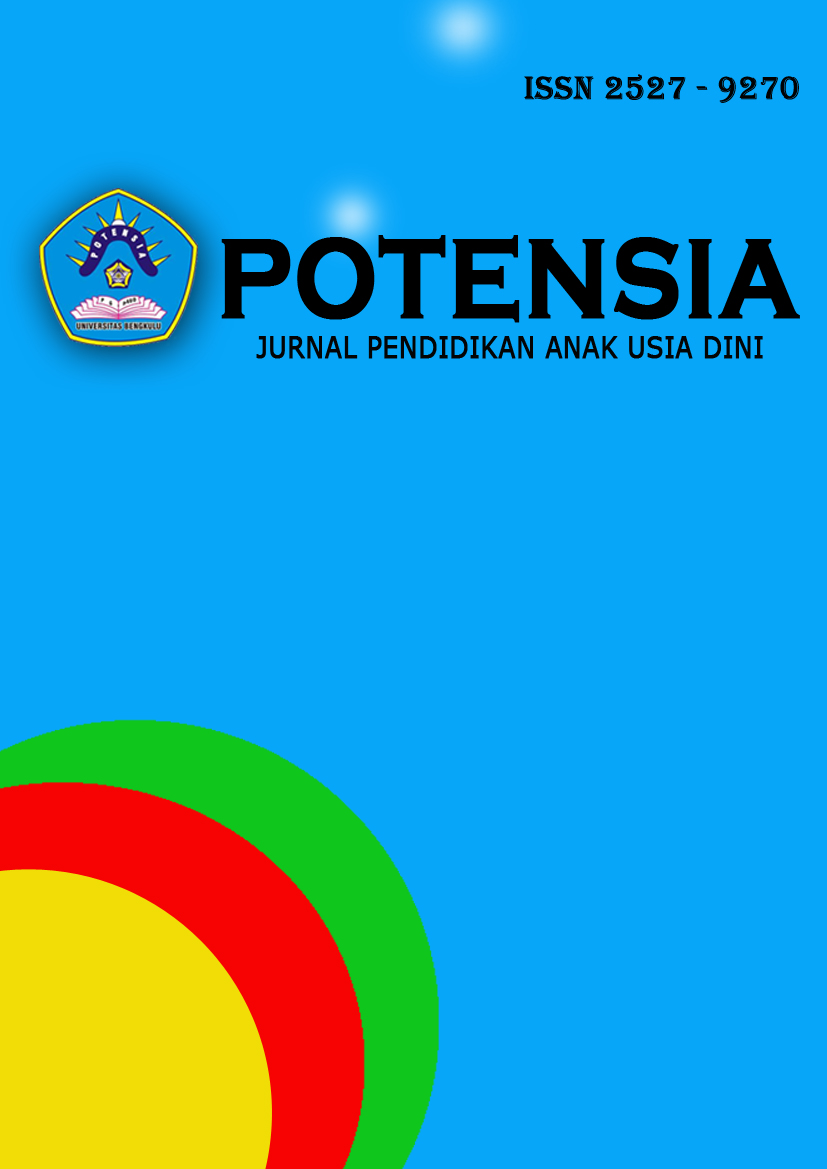Main Article Content
Abstract
This research is based on the phenomenon, the existence of hyperactive child behavior that is difficult to control and tend to disrupt the running of learning process in PAUD Islam Insani, and become a complaint for other educators, also the old oarang, berbegai efforts have been done but not produce effective results , thereby providing a guidance-based group guidance counseling service is expected to be one solution in minimizing hyperactive behavior in children. This study aims to 1) to describe the hyperactive behavior of the children before the service of guidance group based on plastisi game, 2) to describe the level of hyperactive children behavior change after the guild group game guidance service was held. Type of research used in this research is Class Action Research or Clasroom Action Research. The subjects of the study were children of PAUD Islam Insani, class B, which was identified as hyperactive. The research instrument used wide observation. The result of the research shaows that 1). An overview of the child's hyperactive behavior level before the Plasticine Game Guidance Group service, a hyperactive behavioral child is still difficult to control his behavior, unable to calm down, difficult to follow instructions, and tends to upset his friend. 2). An overview of the level of hyperactive child behavior change after the Plasticine Game Group Guiding Service was held. Can be seen from the changes in hyperactive children who have seen that can be controlled behavior and emotions, able to bekosentrasi or quiet in a long time, have been able to follow the instructions given by teachers, able to interact and socialize well to friends sebayannya, no longer scribbling friends book without cause, and if you make a mistake already have the initiative to say sorry and apologize.
Article Details
Authors who publish with this journal agree to the following terms:
- Authors retain copyright and grant the journal right of first publication with the work simultaneously licensed under a Creative Commons Attribution License that allows others to share the work with an acknowledgment of the work's authorship and initial publication in this journal.
- Authors are able to enter into separate, additional contractual arrangements for the non-exclusive distribution of the journal's published version of the work (e.g., post it to an institutional repository or publish it in a book), with an acknowledgment of its initial publication in this journal.
- Authors are permitted and encouraged to post their work online (e.g., in institutional repositories or on their website) prior to and during the submission process, as it can lead to productive exchanges, as well as earlier and greater citation of published work (See The Effect of Open Access).
- This work is licensed under a Creative Commons Attribution-ShareAlike 4.0 International License.
References
- Bherman, dkk. 2000. “Nelson Textbook of Pediatrics” dalam Samik, Wahab (ed). Ilmu Kesehatan Anak Nelson. Jakarta : Buku Kedokteran EGC.
- Davison, Gerald C, dkk. 2006. “Psikologi Abnormal Edisi ke-9”. Jakarta : PT Raja Grafindo Persada.
- Latif, Muktar, dkk. 2013. “Orientasi Baru Pendidikan Anak Usia Dini”. Jakarta : Kencana.
- Muhammad, Jamila K.A. 2008. “Special Education For Special Children PanduanPendidikan Khusus Anak-anak dengan Ketunaan dan Learning Disabilities”. Jakarta : Hikmah (Mizan publika).
- Prayitno. 2012. “Jenis Layanan Kegiatan Pendukung Konseling”. Program Pendidikan Profesi Konselor Jurusan Bimbingan dan Konseling Fakultas Ilmu Pendidikan Universitas Negeri Padang.
- Prayitno. 2002. “Layanan Bimbingan dan Konseling Kelompok”. Jakarta : Ghalia Indonesia.
- Sudjana, Nana. 2010. “Penilaian Hasil Proses Belajar Mengajar”. Bandung : PT Remaja Rosdakarya.
- Sumanto. 2005. “Pengembangan Kreativitas Seni Rupa Anak TK”. Jakarta: Diretur Pembinaan Pendidikan Tenaga Kependidikan dan Ketenagaan Perguruan Tinggi.
- Wanci, Geraldine K, dkk. 2000. “Prilaku Anak Usia Dini”. Jakarta : Grafindo
References
Bherman, dkk. 2000. “Nelson Textbook of Pediatrics” dalam Samik, Wahab (ed). Ilmu Kesehatan Anak Nelson. Jakarta : Buku Kedokteran EGC.
Davison, Gerald C, dkk. 2006. “Psikologi Abnormal Edisi ke-9”. Jakarta : PT Raja Grafindo Persada.
Latif, Muktar, dkk. 2013. “Orientasi Baru Pendidikan Anak Usia Dini”. Jakarta : Kencana.
Muhammad, Jamila K.A. 2008. “Special Education For Special Children PanduanPendidikan Khusus Anak-anak dengan Ketunaan dan Learning Disabilities”. Jakarta : Hikmah (Mizan publika).
Prayitno. 2012. “Jenis Layanan Kegiatan Pendukung Konseling”. Program Pendidikan Profesi Konselor Jurusan Bimbingan dan Konseling Fakultas Ilmu Pendidikan Universitas Negeri Padang.
Prayitno. 2002. “Layanan Bimbingan dan Konseling Kelompok”. Jakarta : Ghalia Indonesia.
Sudjana, Nana. 2010. “Penilaian Hasil Proses Belajar Mengajar”. Bandung : PT Remaja Rosdakarya.
Sumanto. 2005. “Pengembangan Kreativitas Seni Rupa Anak TK”. Jakarta: Diretur Pembinaan Pendidikan Tenaga Kependidikan dan Ketenagaan Perguruan Tinggi.
Wanci, Geraldine K, dkk. 2000. “Prilaku Anak Usia Dini”. Jakarta : Grafindo
